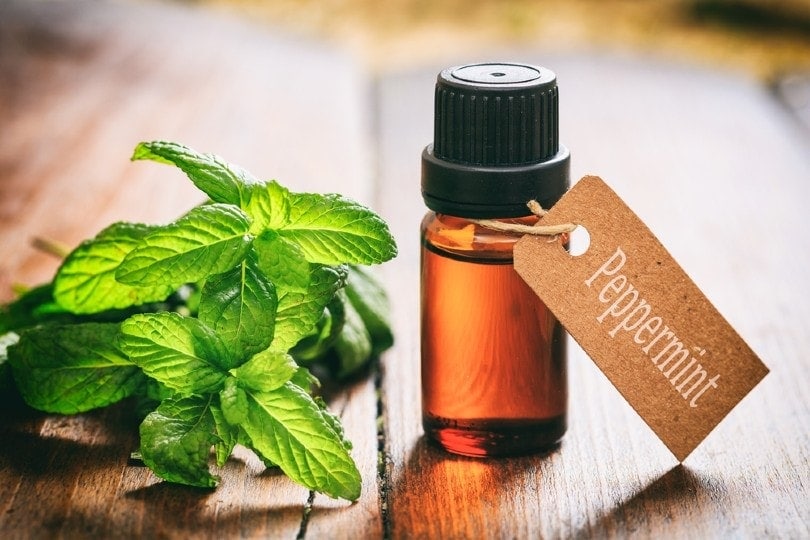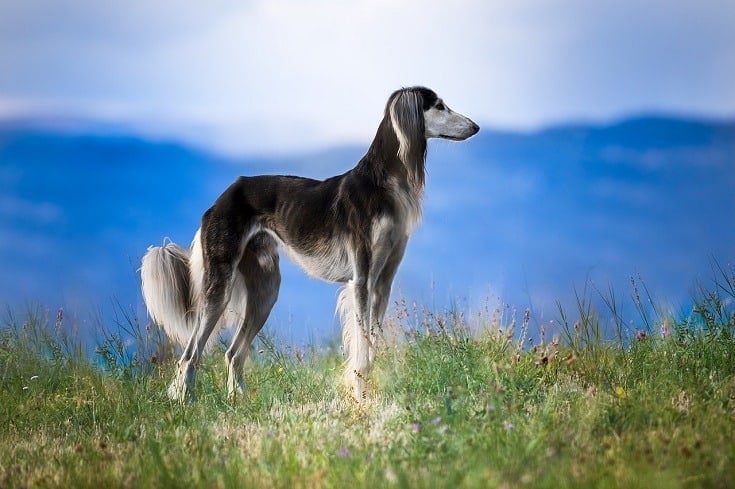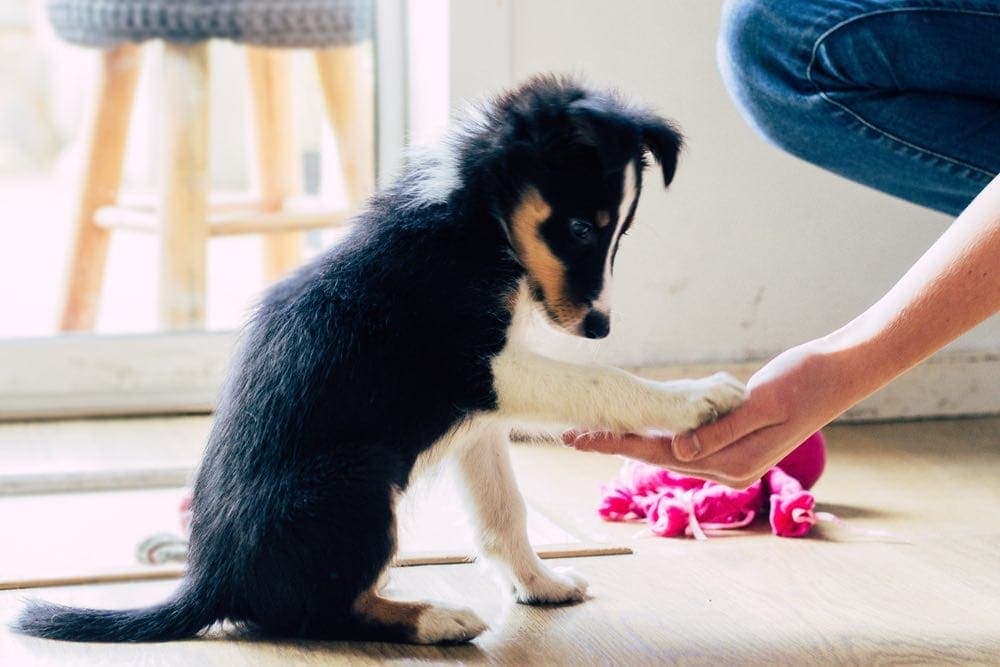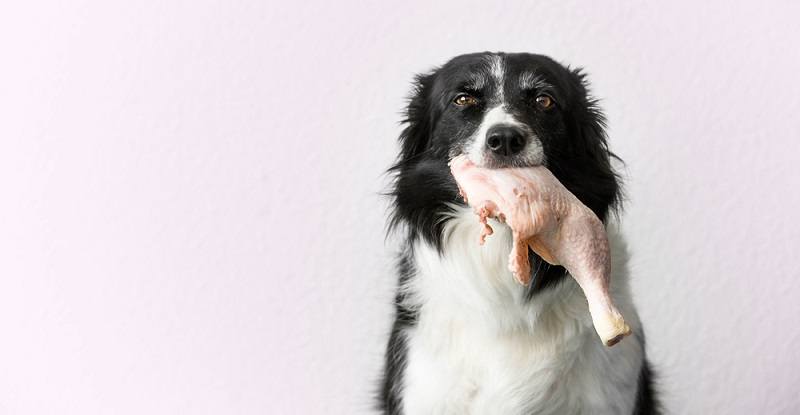Peppermint oil can be beneficial for humans, as it can help with things from headaches and muscle aches to treating colds and reducing stress. So, if it is helpful for us, surely it can help our dogs, right? That would be a big nope! Peppermint oil is not only unsafe for your dog but is also considered toxic.
We go over the reasons that you should avoid giving peppermint oil to your dog and what to do if your pup gets into some.
Is Peppermint Oil Safe for Dogs?
Technically, peppermint is an herb that is a part of the mint family, which can be found growing wild in Europe and North America. It’s a hybrid that’s a cross of the water mint and spearmint.
Peppermint can make a tasty and refreshing treat, such as peppermint tea, candy canes, and even as a mint pesto sauce!
The essential oil is extracted from the peppermint plant’s leaves, which is a strong and concentrated oil used for its health benefits and aromatherapy.
Peppermint contains a high concentration of menthol, which is what gives peppermint its distinctive odor and flavor.
We know and love peppermint oil and its variety of health benefits for humans, so why is it so different for dogs?
Tick and Flea Prevention
You may have heard that peppermint oil can be a great natural remedy for the treatment of ticks and fleas, but this is not true.
“All natural” doesn’t always mean all safe, especially for our pets. Don’t try to create your own concoction containing any essential oils. If you’re concerned about using medication or chemicals to treat parasites, speak to your vet. They will recommend the treatment that is best for your dog.
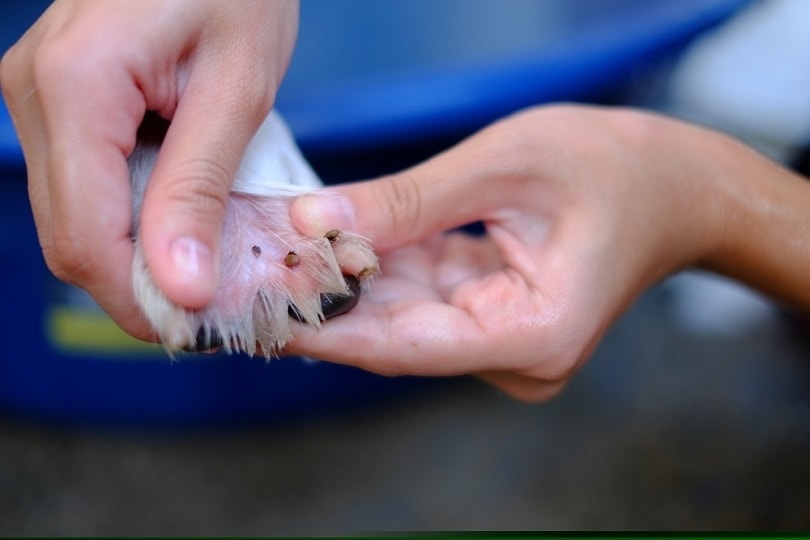
Peppermint Oil and Dogs
The ASPCA has placed peppermint and all mint plants on its toxic plant list. This is not only for dogs but also cats and horses.
It can provoke vomiting and diarrhea if enough peppermint is ingested, but it can also cause breathing difficulties and skin irritation.
Essential oils can also be absorbed through their skin and into their system, which is then processed by the liver. This is bad for any dogs with liver disease, as well as very young or senior dogs.
If your dog ingests peppermint oil orally, you should call the ASPCA Animal Poison Control Center at (888) 426-4435.
There’s also the Pet Poison Helpline (855-764-7661) for Canada, the U.S., and the Caribbean and the Animal Poison Line (01202 509000) for the U.K. All these calls charge a fee. Otherwise, you should speak to your vet as soon as possible.
All essential oils need to be diluted quite a bit before using them on or near your pets, as they are quite potent when in their pure form. Even the smell of peppermint oil can be too much for your dog. We humans have around 6 million olfactory receptors in our noses, while dogs have as much as 300 million!
Is Peppermint Essential Oil Safe for Dogs?
Diluted peppermint oil, in some cases, might be okay. Many pet companies use small amounts of peppermint oil in their products that are safe for dogs to eat or be bathed in. It’s all about using it in moderation and in a very diluted form.
Before you consider adding peppermint to your dog’s food or their coat, you should always speak to your vet first. If you’ve purchased a product meant for dogs that contains peppermint, be sure to follow the instructions, and don’t give your dog more than the recommended amount.
It’s also good to keep in mind that most dogs dislike the scent of peppermint, given the potency of the smell of mint and their sensitive noses.
Is Peppermint Safe for Dogs?

The peppermint plant isn’t as potent as the essential oil. If a dog eats a large amount of the plant, it is toxic and will lead to gastrointestinal upset (namely, vomiting and diarrhea). If you’ve ever smelled or tasted a fresh mint plant, you will notice that it isn’t that strong smelling or tasting until you crush it.
The essential oil is definitely more dangerous for dogs because it’s a much higher concentration, but you’ll still need to keep your dog away from the plant. That said, most dogs will naturally stay away.
Are Other Essential Oils Safe For Dogs?
The general rule is that you should avoid giving your dog any essential oils, particularly in their undiluted form. Essential oils can be quite beneficial for people, but animals are a different story.
- Tea tree oil
- Cinnamon
- Eucalyptus
- Pine
- Wintergreen
- Sweet birch
- Citrus
- Pennyroyal
- Ylang ylang
- Peppermint
These can all cause almost a chemical-like burn with direct contact on the skin and when licked.
Furthermore, if you use essential oils in a diffuser, this can be just as dangerous for your pets as ingesting it. Diffusers send tiny droplets of essential oil into the air, which is inhaled and can lead to pneumonia.
If you use a diffuser in a room that your pet does not have access to, this might work, but you also need to check with your vet what kinds of essential oils are okay in a home with pets. However, if your dog has any breathing issues, diffusers are never a good idea.

Signs of Essential Oil Poisoning
If your dog has gotten into some essential oil or if you just suspect it but aren’t sure, these are a few of the signs of essential oil poisoning:
- Weakness
- Lethargy
- Difficulty breathing
- Drooling
- Muscle tremors
- Vomiting and diarrhea
- Uncoordinated
- Difficulty walking
- Pawing at face and mouth
- Burns or redness on gums, tongue, or skin
If you believe that your dog has had access to any essential oils and you have observed any of these symptoms, bring your dog to your vet immediately or call the Pet Poison Helpline. The sooner you get treatment for your dog, the better the outcome.
Essential Oil Poisoning Treatment
If you find your dog with essential oil on their fur, you should wash it off immediately using dishwashing soap. If you believe that your dog has inhaled or ingested any, you do need to bring them to the vet.
The vet will run blood work to check your dog’s kidneys and liver to see if they were affected. The vet will also potentially treat your dog with medication to prevent vomiting, as well as antibiotics, protectants for the stomach, pain medication, and medication designed to protect the liver.
IV fluids and possibly a feeding tube might be necessary if your dog has suffered from chemical burns in the esophagus and mouth.
Conclusion: Is Peppermint Oil Safe for Dogs
Peppermint oil has its advantages, but if you have any pets, it’s safest to keep your animals away from it. This is especially true for cats; while essential oils are toxic to dogs, they are especially fatal for cats.
We can’t emphasize it enough: Speak to your vet if you’re trying to help your dog with any kind of medical issue, no matter how mild it is! Your vet can help you find the right product so you can rest easy knowing that your dog will be safe and healthy.
Related Reads:
- Younger Dog Attacking Older Dog? Here’s What to Do!
- How to Treat Pit Bull Skin Problems
- What to Put on a Dog Tag – Dog Tag 101
Featured Image Credit: rawf8, Shutterstock
Contents
